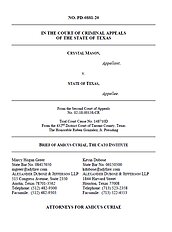Learn more about Cato’s Amicus Briefs Program.
After serving a five-year sentence in federal prison for fraud, Crystal Mason was placed on three years of supervised release. While on supervised release, Mason attempted to vote in the 2016 general election. Because her name had been removed from voter-registration rolls upon her conviction, she completed a provisional ballot as invited to do by an election official at the polling place. Because she was still on supervised release, however, it turned out that she was not eligible to vote under state law. Her neighbor, who was an elections judge for the precinct in which Mason resided, alerted the Tarrant County DA’s office, which then prosecuted her for casting an illegal vote. Mason was convicted and sentenced to five years in prison. The Fort Worth Court of Appeals affirmed, and Mason is now seeking discretionary review in Texas’s highest court for criminal matters, the Court of Criminal Appeals.
The issue on appeal is whether the state had to prove that Mason knew she was ineligible to vote or only that she knew of the underlying facts—here, that she was still on supervised release and therefore had not completed all of the punishment associated with her federal fraud conviction—that made her ineligible to vote. The mid-level appellate court held that the latter showing was sufficient, notwithstanding the unambiguous text of the statute, which states that “[a] person commits an offense if the person…votes…in an election in which the person knows the person is not eligible to vote.”
Cato’s amicus brief explains that overcriminalization is a growing concern that threatens the legitimacy of the criminal justice system. One way to ameliorate the problem of overcriminalization is to interpret criminal statutes strictly, including particularly state-of-mind or “mens rea” requirements. Not only is the statutory text in this case clear that the defendant must know the conduct itself is illegal (i.e., voting in an election before completing a term of supervised release), but there is a 2014 Texas Court of Criminal Appeals case, Delay v. State (involving alleged campaign-finance violations by former Congressman Tom DeLay), in which the court held that an analogous—but more ambiguous—provision of the Election Code required the state to prove actual knowledge of illegality. Perhaps not surprisingly, the mid-level court of appeals relegated its discussion of that case to a single simplistic footnote despite the fact that it is not only relevant but in fact commands a different result.
Finally, we argue that Mason’s prosecution is particularly unjust because it flies in the face of a federal law, the Help America Vote Act, which creates a procedure whereby people whose names do not appear on the voter-registration rolls may cast a provisional ballot that is held until their eligibility can be ascertained—which is precisely what happened here. As noted, Mason was invited to avail herself of that process by an election official at her polling place, and to treat that as a criminal offense means that any number of the other 44,000 Texans who cast provisional ballots but were later determined to be ineligible could be prosecuted as well. This kind of “trap for the unwary” is both unfair to individual defendants like Crystal Mason and incompatible with the legitimate aims of the criminal law.

This work is licensed under a Creative Commons Attribution-NonCommercial-ShareAlike 4.0 International License.
